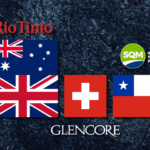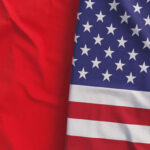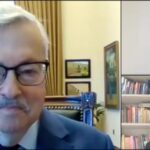
A Refined Approach to China: Jessica Chen Weiss on US-China Relations
Jessica Chen Weiss is trending right now. After a high-profile New Yorker feature, she is being characterized as the embodiment of a refined approach to China in Washington. Before the New Yorker article, we are proud to say that we had the opportunity to sit down with her at our KraneShares Annual Institutional Investor Conference held at the Yale Club in New York City on November 30. Weiss’s influence stems from her recent position as a Senior Advisor to U.S. Secretary of State Antony Blinken and her role as the Michael J. Zak Professor for China and Asia-Pacific Studies at Cornell University, where she specializes in Chinese politics and nationalism.
Weiss was joined by KraneShares General Counsel and former U.S. Ambassador to Singapore, David Adelman. Adelman leads an ongoing discussion series at KraneShares featuring policymakers and thought leaders on diplomacy and US-China relations. Recent programs have included discussions with former U.S. Secretary of State Henry Kissinger, U.S. Ambassador to China during the Trump Administration, Terry Branstad, U.S. Ambassador to China during the Obama Administration Max Baucus, and former U.S. Secretary of the Navy Ray Mabus.
Key takeaways from Weiss’s discussion:
- Protests in China were primarily aimed at zero COVID policies, but public health issues are still a concern
- After the Biden-Xi summit at the G20 conference in Bali, there have been positive steps forward in the US-China relationship, but challenges still exist
- China’s desire for international stability is creating a window for diplomacy with the U.S. and new “limits” to China’s “friendship without limits” with Russia
- U.S. export controls on semiconductors are centered around national security concerns and did not come as a surprise to China
- China changing its laws to allow U.S. Public Company Accounting Oversight Board (PCAOB) officials into Hong Kong for the first time shows there are areas where compromise is achievable
- While U.S. domestic politics surrounding Taiwan may present a risk of escalation, China prefers a peaceful approach to dealing with Taiwan
We have summarized the key highlights of the discussion and provided the video of the discussion below.
COVID-19
China’s early success at containing previous strains of the COVID virus initially saved countless lives, garnered public support, and served as a source of national pride. Recently, China struggled to keep the more contagious Omicron variant at bay. The resurgence of cases in November came with a corresponding increase in public frustration with the government’s zero-COVID policy and strict containment measures. Widespread lockdowns led to significant economic disruption and other adverse effects, which fueled public protests in November.
Weiss pointed out that while the foreign media picked up on some “really striking slogans, particularly out of Shanghai,” disparaging the Chinese Communist Party, she believes this only represented a “very small minority.” She views most of the protests as not directed at the government itself but at the zero-COVID policy and its effects. She said, “most people just want to go back to the way that they were living, when they had the ability to go in and out of their apartments… especially as the world has really moved on, in many ways.”
Adelman pointed out that the lack of comments on the protests by the Biden Administration could be interpreted as a sign of potential improvement in relations. Weiss commented that this was a strategic calculation in response to Chinese State media pushing a narrative that the protests were caused by the “black hand of foreign forces.” By limiting official U.S. comments to standard statements supporting the right to peaceful assembly, the Biden Administration avoided both stoking tensions with China and lending credence to the claims of foreign interference.
Adelman and Weiss agreed that China faced a significant public health challenge. China has struggled to adequately vaccinate its elderly population, which remains particularly vulnerable to the virus. This issue is compounded by China’s current hospital-based healthcare infrastructure, which may experience capacity restraints as cases increase. Despite these challenges, Weiss spoke optimistically about China’s plan to vaccinate its elderly population and its progress on various vaccine approvals. Following the conference, China approved Pfizer’s Paxlovid and Genuine Biotech’s Azvudine COVID treatments.
US-China Relations
The recent G-20 Summit in Bali between President Xi Jinping of China and President Joe Biden of the United States was an important event, marking the first time the two leaders have met in person since Biden took office. Adelman characterized the meeting as “quite substantive and quite constructive,” with both sides agreeing to work together to manage their relationship and avoid conflicts in the future.
One of the summit’s key outcomes was the creation of specialized groups that would be composed of representatives from both countries. Weiss said, “they will begin to empower senior and working level groups to work out concrete areas of cooperation in specific issue areas, and more importantly, to begin talking about principles to manage their relationship at the highest level.” These groups will work on various issues, including trade, climate change, and global health. The goal is to increase cooperation and communication between the United States and China to promote coexistence and mutually beneficial outcomes.
Heading into 2023, both countries are creating breathing space and taking tentative steps toward creating what Weiss called a “floor” for US-China tensions. U.S. Secretary of State Antony Blinken’s scheduled visit to China later in 2023 will continue the work of the G-20 Summit and could build momentum for further cooperation.
International Stability
Since President Xi Jinping's reelection for a third term at the 20th Party Congress, his political position has seemingly never been stronger. However, Xi is not without his challenges. He faces domestic headwinds, including navigating away from China's zero-COVID policy and ramping up quality and economic growth. Additionally, he is looking for a degree of international stability, despite concerns over Taiwan and other issues. Weiss believes President Xi’s desire for international stability while he tackles domestic issues creates a window that she hopes the “United States and China will move quickly to seize.”
Adelman turned the discussion of international stability toward the Russia-Ukraine conflict. The “friendship without limits” discussion between President Xi and Vladimir Putin put China in a delicate but strategic position regarding the Ukraine conflict. China has avoided becoming entangled in the conflict while still importing Russian natural resources on which the Chinese economy depends.
Weiss said that China is trying to straddle its many different interests, including maintaining economic ties with Russia, stabilizing relations with the United States, and simultaneously not letting Europe drift too far toward the United States. Weiss believes these various factors contributed to the agreement in Bali, where China opposed the threat or use of nuclear weapons in Ukraine. While this agreement was largely symbolic, Weiss thinks it is an important sign that China is not “all in” with Russia, even as it continues to maintain its strategic partnership of “so-called friendship without limits, which obviously does have limits.”
Semiconductor Controls
The October 7th U.S. export controls on supplying semiconductors to China are an attempt by the U.S. to maximize its lead over China in the chip industry, particularly for military applications. The balance between national security and economic logic will likely determine the outcome of this conflict. For now, Weiss said, “this is very much a national security-driven discussion,” which is dominating export control decisions.
Nevertheless, China has been expecting these semiconductor controls for years and has already begun promoting domestic production of advanced chips. This will be a long-term project, but it could ultimately benefit China, as described in our article U.S. Export Control – Impact & Opportunity for China’s Semiconductor Industry. Adelman noted that these controls were implemented before the Biden-Xi meeting, indicating that both parties still desire a more substantial relationship while maintaining a level of "friendly" competition.
PCAOB Auditors Visit China
The recent visit by auditors from the Public Company Accounting Oversight Board (PCAOB) to China reflects a desire and recognition of the need to manage US-China relations. Both countries have deeply intertwined economies, and further progress could benefit both sides significantly. The PCAOB is a U.S. government agency overseeing public companies' auditing. Its visit to China is part of an ongoing effort to improve cooperation and communication between the two countries to promote transparency and accountability in financial reporting. The PCAOB auditors visiting China is a positive development, which Weiss believes reflects a recognition by China of the benefits of staying connected to U.S. capital markets. As Weiss said, “here's a place where China truly, I think, is trying to meet the U.S. standards.”
Following our conference, the PCAOB announced that it had secured complete access to inspect and investigate Chinese firms, allowing them to maintain their U.S. listings in compliance with the Holding Foreign Companies Accountable Act (HFCAA).
Cross-strait Relations
Weiss believes cross-strait relations between China and Taiwan became increasingly concerning, leading up to and in the aftermath of Speaker of the House Nancy Pelosi's visit to Taiwan, as it could have placed “more pressure” on China to respond in a serious manner. The White House and President did not support the visit but did not actively object to it out of respect for Pelosi's position as a separate but coequal branch of government. However, Weiss said China's response to the visit was “carefully circumscribed to make a point, but not actually raise the risk of anything actually happening.” One of the critical ways China responded was by essentially erasing the Taiwan Strait's median line and cutting off communication channels. These channels are now being restored in the wake of the G-20 Summit.
The Biden administration's response to the situation has been to conduct business as usual without backing down or escalating tensions. This approach is key to maintaining strategic understanding and compromise between the United States and China on the issue of Taiwan and other geopolitical concerns. Weiss pointed out China’s extensive range of “grey zone” tactics to gain control of Taiwan without resorting to military force. For example, China has been gradually promoting economic integration across the strait to assimilate Taiwan into the Chinese mainland. Weiss noted that Taiwan's elections will determine the end game of this situation.
Weiss stated that domestic politics in the United States around Taiwan is a significant source of instability over this issue. Former U.S. officials have called not just for a move toward a more explicit commitment to Taiwan's defense but have even suggested that the One China policy has outlived its utility. Former Secretary of State Mike Pompeo even called for the United States to recognize Taiwan. Weiss believes these types of statements from the U.S., if they were to become policy, pose a risk of forcing China to take actions it would not otherwise take.
Weiss argues that the United States needs to maintain the status quo and strategic ambiguity to deter military force by China and discourage independence-minded politicians in Taiwan from going too far. Both sides must maintain a strategic understanding and a willingness to compromise to prevent further escalation or military action and to maintain stability in the region.
Conclusion
KraneShares was honored to be joined by Jessica Chen Weiss and to hear her pragmatic insight on approaching U.S.-China relations. We echo Weiss’ view that the current action-reaction dynamic between the two countries is counterproductive, and that the U.S. should recognize China as a competing nation but work towards a relationship based on increased communication and coexistence.
Bio
Jessica Chen Weiss is the Michael J. Zak Professor for China and Asia-Pacific Studies in the Department of Government at Cornell University. From August 2021 to July 2022, she served as senior advisor to the Secretary's Policy Planning Staff at the U.S. State Department on a Council on Foreign Relations Fellowship for Tenured International Relations Scholars (IAF-TIRS). She recently published a report in a Foreign Affairs article, which described her concerns over U.S. foreign policy called “The China Trap.” Weiss is also the author of Powerful Patriots: Nationalist Protest in China’s Foreign Relations (Oxford University Press, 2014). Her research appears in International Organization, China Quarterly, International Studies Quarterly, Journal of Conflict Resolution, Security Studies, Journal of Contemporary China, and Review of International Political Economy, as well as in the New York Times, Foreign Affairs, Los Angeles Times, and Washington Quarterly.










